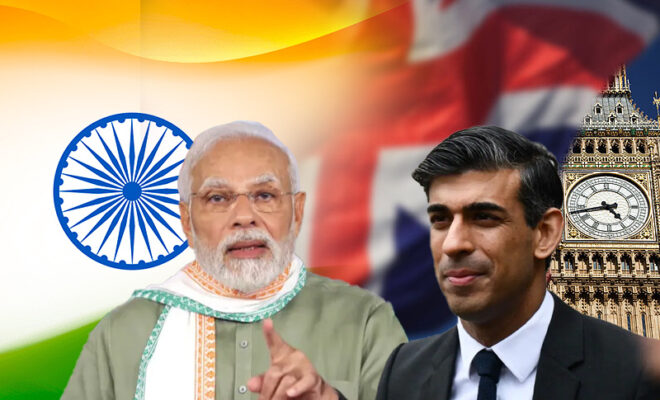India must be realistic with its expectations of Rishi Sunak

The UK’s new prime minister, Rishi Sunak, was congratulated by Prime Minister Narendra Modi through Twitter on the day of Diwali. PM Modi underlined his wish to collaborate closely with Sunak on international issues and carry out Roadmap 2030 in his cordial message. As the first non-white and Hindu prime minister of the UK and head of the largely white Conservative Party, Sunak’s selection caused a social media frenzy in India.
Although the diaspora’s perception of Sunak is positive, it is important to keep expectations for the new UK PM in check because some institutional barriers prevent relations between India and the UK from developing as they may. The largest worry is that leaders of Indian ancestry in third nations tend to overcompensate for their so-called minority disadvantage and are more obedient than the monarch when dealing with their home country. This concern is supported by past occurrences.
However, PM Sunak is less concerned with the India-UK FTA than he is with restoring the British economy and reining in the spiralling inflation. It is clear that merely fiddling with taxes and interest rates won’t help the UK economy, which has been hurt by Brexit and made worse by the continued conflict in Ukraine and the global effects of the Covid epidemic.
The Covid epidemic is still present, the UK has yet to recover economically from Brexit, and the conflict in Ukraine fundamentally pits the US-led NATO against Vladimir Putin’s Russia. To put it simply, PM Sunak faces a difficult journey.
Although Sunak’s nomination may have legitimately thrilled the Indian diaspora, it is difficult to say whether it will strengthen ties with India given the Narendra Modi administration’s national security concerns.
The UK will need to take action against radical Khalistani forces who are openly raising money at gurudwaras in Britain and radicalising Sikh youth against India because security is the Modi government’s top priority. The problem has been brought up with their British counterparts at the highest levels by both the national security advisor and the minister of external affairs.
The extradition of Indian economic criminals who are currently finding refuge in Britain and taking advantage of the judicial system represents the second significant barrier to bilateral relations. Even though they have blatantly obvious Indian cases against them that call for extradition, criminals like Vijay Mallya, Nirav Modi, and others have long sought refuge under the British system.
Unless the UK government takes a proactive posture and extradites the white-collar criminals, this will continue to be a major source of contention between the two nations, given the Modi government’s determination to prosecute economic offenders.
The umbilical connection between the British and Pakistani deep states is the third problem that hinders the strengthening of India-UK relations. As a result of Pakistan’s assistance, Britain is able to box in a heavier weight division against Pakistan’s imperial blunders in Jammu and Kashmir because to the legacy of the long-gone British Raj in the subcontinent. In addition to falling into the trap of vote-bank politics, the existence of a sizable Muslim community from the subcontinent in the UK, notably from regions like Mirpur of Pakistan-occupied Kashmir, adds to the dissonance.



